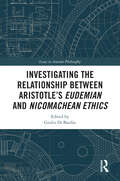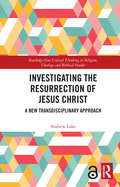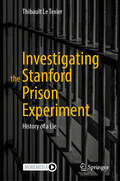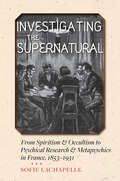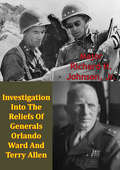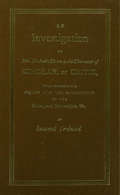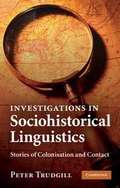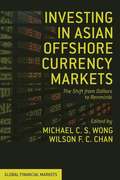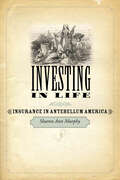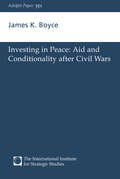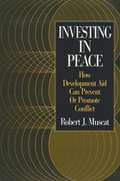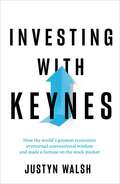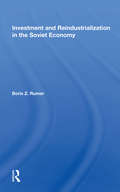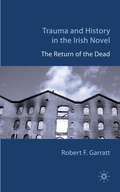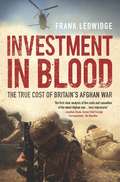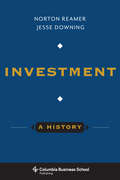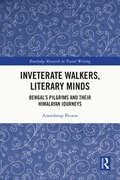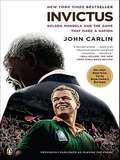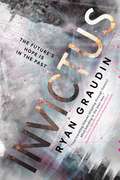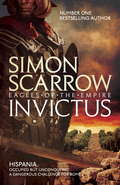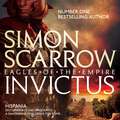- Table View
- List View
Investigating the Relationship Between Aristotle’s Eudemian and Nicomachean Ethics (Issues in Ancient Philosophy)
by Giulio Di BasilioSpecifically focusing on the relationship between the Eudemian and the Nicomachean Ethics, this collection of essays studies major themes from Aristotle’s ethics. This volume builds on a recent revival of interest in Aristotle's Eudemian Ethics, which offers an invaluable complement to the Nicomachean Ethics in the study of the development of Aristotle's ethical ideas. It brings together a series of new studies by leading scholars covering the main points of inquiry raised by the relationship between the two works, exploring their continuities and divergences. At the same time, it showcases a variety of approaches to and perspectives on the main questions posed by Aristotle’s ethical thought. Investigating the Relationship Between Aristotle’s Eudemian and Nicomachean Ethics is offered as a contribution to long-standing debates over Aristotle's ethical thinking, as well as an inspiration for new approaches, which take both of his surviving ethical treatises seriously. The volume will be of interest to students and scholars of ancient philosophy and ethics, particularly Aristotle’s two ethics.
Investigating the Resurrection of Jesus Christ: A New Transdisciplinary Approach (Routledge New Critical Thinking in Religion, Theology and Biblical Studies)
by Andrew LokeThis book provides an original and comprehensive assessment of the hypotheses concerning the origin of resurrection Christology. It fills a gap in the literature by addressing these issues using a transdisciplinary approach involving historical-critical study of the New Testament, theology, analytic philosophy, psychology and comparative religion. Using a novel analytic framework, this book demonstrates that a logically exhaustive list of hypotheses concerning the claims of Jesus’ post-mortem appearances and the outcome of Jesus’ body can be formulated. It addresses these hypotheses in detail, including sophisticated combinations of hallucination hypothesis with cognitive dissonance; memory distortion; and confirmation bias. Addressing writings from both within and outside of Christianity, it also demonstrates how a comparative religion approach might further illuminate the origins of Christianity. This is a thorough study of arguably the key event in the formation of the Christian faith. As such, it will be of keen interest to theologians, New Testament scholars, philosophers, and scholars of religious studies.
Investigating the Stanford Prison Experiment: History of a Lie
by Thibault Le TexierIn 1971, psychologist Philip Zimbardo ran the now famous Stanford prison experiment to show that prison could make normal people behave in pathological ways. Based on the first thorough investigation in the archives of the experiment and on interviews with about half of its participants, this book shows that the Stanford prison experiment is far from being scientific. In particular, the guards knew what results were expected from them, they were trained and supervised by the experimenters, and they were following a schedule and a set of rules written by the experimenters. The experimenters deceived the guards and made them believe they were not subjects. They also borrowed many elements from a previous student experiment without disclosing this information in their reports. The prisoners were not allowed to leave the experiment at will, and they were conditioned by the experimenters. The mock prison situation was unrealistic. Most participants did not forget they were participating in an experiment, and many responded to demand characteristics. The data was not collected properly. And the conclusions were pre-written according to non-academic aims. This book goes beyond the experiment to provide ample background and context, in order to understand how the experiment was planned, financed, recorded, and divulged in the press and within the academic. It discusses also the role played by Philip Zimbardo in the trial of one of the guards of Abu Ghraib, as well as the impact of mass media on science, the debates between personal psychology and social psychology, and the specific nature of cold war social science.
Investigating the Supernatural: From Spiritism and Occultism to Psychical Research and Metapsychics in France, 1853–1931
by Sofie LachapelleSéances were wildly popular in France between 1850 and 1930, when members of the general public and scholars alike turned to the wondrous as a means of understanding and explaining the world. Sofie Lachapelle explores how five distinct groups attempted to use and legitimize séances: spiritists, who tried to create a new "science" concerned with the spiritual realm and the afterlife; occultists, who hoped to connect ancient revelations with contemporary science; physicians, psychiatrists, and psychologists, who developed a pathology of supernatural experiences; psychical researchers, who drew on the unexplained experiences of the public to create a new field of research; and metapsychists, who attempted to develop a new science of yet-to-be understood natural forces. Lachapelle examines the practices, aims, and level of success of these five disciplines, paying special attention to how they interacted with each other and with the world of mainstream science. Their practitioners regarded mystical phenomena worthy of serious study; most devotees—with notable exceptions of physicians, psychiatrists, and psychologists—also meant to challenge conventional science in general and French science in particular. Through these stories, Lachapelle illuminates the lively relationship between science and the supernatural in late nineteenth- and early twentieth-century France and relates why this relationship ultimately led to the marginalization of psychical research and metapsychics.An enlightening and entertaining narrative that includes colorful people like "Allan Kardec"—a pseudonymous former mathematics teacher from Lyon who wrote successful works on the science of the séance and what happened after death—Investigating the Supernatural reveals the rich and vibrant diversity of unorthodox beliefs and practices that existed at the borders of the French scientific culture in the late nineteenth and early twentieth centuries.
Investigating the Supernatural: From Spiritism and Occultism to Psychical Research and Metapsychics in France, 1853–1931
by Sofie Lachapelle“A convincing account of science’s flirtation with the marginal and the marvelous” from the author of Conjuring Science (Journal of the History of the Behavioral Sciences).Séances were wildly popular in France between 1850 and 1930, when members of the general public and scholars alike turned to the wondrous as a means of understanding and explaining the world. Sofie Lachapelle explores how five distinct groups attempted to use and legitimize séances: spiritists, who tried to create a new “science” concerned with the spiritual realm and the afterlife; occultists, who hoped to connect ancient revelations with contemporary science; physicians, psychiatrists, and psychologists, who developed a pathology of supernatural experiences; psychical researchers, who drew on the unexplained experiences of the public to create a new field of research; and metapsychists, who attempted to develop a new science of yet-to-be understood natural forces.An enlightening and entertaining narrative that includes colorful people like “Allan Kardec”—a pseudonymous former mathematics teacher from Lyon who wrote successful works on the science of the séance and what happened after death—Investigating the Supernatural reveals the rich and vibrant diversity of unorthodox beliefs and practices that existed at the borders of the French scientific culture in the late nineteenth and early twentieth centuries.“What is science? . . . In her engaging book, Sophie Lachapelle probes for an answer by looking at the liminal realm between science and superstition and the attempt to render the supernatural explicable in naturalistic terms.” —Isis“A welcome addition to the growing literature on spiritism, occultism and physical research in modern France.” —French History
Investigation Into The Reliefs Of Generals Orlando Ward And Terry Allen
by Major Richard H. Johnson Jr.Between April and August 1943, the U.S. Army's II Corps saw two of its division commanders relieved of their commands. Each relief appeared tied to battlefield setbacks. MG Orlando Ward of the 1st Armored Division was relieved after his division failed to seize a narrow mountain pass near the town of Maknassy, in Tunisia. Ward's superiors labeled him too cautious, unwilling or unable to motivate his soldiers to take their objective. Months later on the island of Sicily, MG Terry Allen was relieved of command of the 1st Infantry Division. His relief followed the failure to seize the Sicilian town of Troina. Allen's superiors accused him of being too hesitant in committing his entire force to the attack. He was branded an insubordinate rebel who cared only for his own troops.In both cases, a standard history of the events emerged. It was based on the official U.S. Army account and a narrow reading of primary sources. This version of events ascribed each relief to flaws in Ward and Allen's leadership ability. The standard description of the reliefs continues to appear in recent scholarship. However, some accounts departed from the accepted portrayal, and point to alternate reasons behind the reliefs. When these alternative accounts are considered along with a comprehensive examination of primary source material, a new argument emerges. Ward and Allen were removed from command for political and military reasons of expediency. From a broader perspective, this investigation revealed how wartime leaders dealt with unprecedented circumstances to accomplish their goals. Understanding the reliefs of Generals Ward and Allen provides insight into organizational decision making and its effect on the U.S. Army in the early portion of World War II.
Investigation into Mr. Malone's Claim to Charter of Scholar: Volume 24
by Samuel IrelandFirst published in 1970. Routledge is an imprint of Taylor & Francis, an informa company.
Investigations in Sociohistorical Linguistics
by Peter TrudgillIn the last five hundred years or so, the English language has undergone remarkable geographical expansion, bringing it into contact with other languages in new locations. It also caused different regional dialects of the language to come into contact with each other in colonial situations. This book is made up of a number of fascinating tales of historical-sociolinguistic detection. These are stories of origins - of a particular variety of English or linguistic feature - which together tell a compelling general story. In each case, Trudgill presents an intriguing puzzle, locates and examines the evidence, detects clues that unravel the mystery, and finally proposes a solution. The solutions are all original, often surprising, sometimes highly controversial. Providing a unique insight into how language contact shapes varieties of English, this entertaining yet rigorous account will be welcomed by students and researchers in linguistics, sociolinguistics and historical linguistics.
Investing in Asian Offshore Currency Markets
by Michael C. S. Wong Wilson F. C. ChanThe offshore currency market is a foundation of offshore bond market, helping well-established corporations in global financing. Following the global financial tsunami in 2008 and European debt crisis in 2009-2011, this book aims to document the latest issues, challenges, trends and thoughts relating to offshore currency markets in Asia.
Investing in Life: Insurance in Antebellum America (Studies in Early American Economy and Society from the Library Company of Philadelphia)
by Sharon Ann MurphyWinner, Hagley Prize in Business History, Hagley Museum and Library and the Business History ConferenceInvesting in Life considers the creation and expansion of the American life insurance industry from its early origins in the 1810s through the 1860s and examines how its growth paralleled and influenced the emergence of the middle class.Using the economic instability of the period as her backdrop, Sharon Ann Murphy also analyzes changing roles for women; the attempts to adapt slavery to an urban, industrialized setting; the rise of statistical thinking; and efforts to regulate the business environment. Her research directly challenges the conclusions of previous scholars who have dismissed the importance of the earliest industry innovators while exaggerating clerical opposition to life insurance.Murphy examines insurance as both a business and a social phenomenon. She looks at how insurance companies positioned themselves within the marketplace, calculated risks associated with disease, intemperance, occupational hazard, and war, and battled fraud, murder, and suicide. She also discusses the role of consumers—their reasons for purchasing life insurance, their perceptions of the industry, and how their desires and demands shaped the ultimate product.
Investing in Life: Insurance in Antebellum America (Studies in Early American Economy and Society from the Library Company of Philadelphia)
by Sharon Ann MurphyA study of the early years of the life insurance industry in 19th century America.Investing in Life considers the creation and expansion of the American life insurance industry from its early origins in the 1810s through the 1860s and examines how its growth paralleled and influenced the emergence of the middle class.Using the economic instability of the period as her backdrop, Sharon Ann Murphy also analyzes changing roles for women; the attempts to adapt slavery to an urban, industrialized setting; the rise of statistical thinking; and efforts to regulate the business environment. Her research directly challenges the conclusions of previous scholars who have dismissed the importance of the earliest industry innovators while exaggerating clerical opposition to life insurance.Murphy examines insurance as both a business and a social phenomenon. She looks at how insurance companies positioned themselves within the marketplace, calculated risks associated with disease, intemperance, occupational hazard, and war, and battled fraud, murder, and suicide. She also discusses the role of consumers?their reasons for purchasing life insurance, their perceptions of the industry, and how their desires and demands shaped the ultimate product.Winner, Hagley Prize in Business History, Hagley Museum and Library and the Business History ConferencePraise for Investing in Life“A well-written, well-argued book that makes a number of important contributions to the history of business and capitalism in antebellum America.” —Sean H. Vanatta, Common Place“An intriguing, instructive history of the establishment and development of the life insurance industry that reveals a good deal about changing social and commercial conditions in antebellum America . . . Highly recommended.” —Choice
Investing in Peace: Aid and Conditionality after Civil Wars (Adelphi series #Vol. 351)
by James K. BoyceThis book analyzes the provision of aid to countries that have undergone negotiated settlements to civil wars, drawing on recent experiences in Bosnia, Cambodia, El Salvador, and Guatemala. It focuses on the potential for peace conditionality, linking aid to steps to implement accords and consolidate the peace. The book explores how aid can encourage domestic investment in peace-related needs; the reconciliation of long-run peacebuilding objectives with short-run humanitarian imperatives; and the obstacles that donors' priorities and procedures pose to effective aid for peace. It concludes that investing in peace requires not only the reconstruction of war-torn societies but also the reconstruction of aid itself.
Investing in Peace: How Development Aid Can Prevent or Promote Conflict
by Robert J. MuscatInternational intervention in internal wars has gained rhetorical legitimacy in the post-cold war period, but in practice it has remained problematic. Response to these conflicts has remained mainly diplomatic and military - and belated. Is there anything international actors can do to prevent, or at least ameliorate, such conflicts? Are conflict-prevention measures already being attempted, and sometimes succeeding so well that we are unaware of their effectiveness? If so, what can we learn from them? In this book, Robert J. Muscat, a veteran international development expert who has worked in South America, South and Southeast Asia, East Africa, and the Balkans, attempts to answer these questions. Drawing on the work of others as well as his own extensive experience, he reviews the accrued insights into the causes of internal conflict. He examines nine cases in which the work of development agencies exacerbated or ameliorated the root causes of conflict. This permits some generalizations about the efficacy or deleterious effects of development programs - and of their futility when the conflict-prevention dimension of international assistance efforts is ignored.
Investing with Keynes: How the World's Greatest Economist Overturned Conventional Wisdom and Made a Fortune on the Stock Market
by Justyn WalshA guide to John Maynard Keynes—one of the greatest economic minds of the twentieth century—for today's investor.John Maynard Keynes was a many-sided figure – world-changing economist, architect of the post-War international monetary system, bestselling author, a Baron in the House of Lords, and key member of the Bloomsbury group. He also had the talent and ability to make vast sums of money in the stock market. At the time of his death, Keynes' net worth—almost entirely built through successful stock investments—amounted to the present-day equivalent of more than $30 million. Additionally, the college endowment fund he managed had massively outperformed the broader market over a two-decade period. Keynes was a member of that rare breed—an economist who flourished not only in the rarefied heights of ivory tower academia, but also amidst the hustle and votility of the financial markets. How does a study of Keynes—the shrewd stock picker and star fund manager—benefit the modern investor? In this volatile era, Keynes' observations on stock market behaviour, in fact, are more relevant than ever. Accessible and informative, this book identifies what modern masters of the market have taken from Keynes and used in their own investing styles—and what you too can learn from one of the most influential economic thinkers of the twentieth century.
Investment And Reindustrialization In The Soviet Economy
by Boris Z. RumerInvestment activity in the Soviet Union is presently undergoing a decline hitherto unknown in the history of the nation: The growth of capital investment has stopped, while levels of production have fallen. One important factor in this phenomenon is the Soviet policy of reindustrialization—shifting new investments into the expansion and improvement of existing facilities—which severely limits capital available for new construction. In this book, Dr. Rumer examines current Soviet investment policies and assesses their impact on economic development, especially in Siberia. Reindustrialization is intended to combine more rapid amortization for updating and retooling, growth in the volume of industrial output, and minimal capital investment. However, concludes Dr. Rumer, this investment pattern hinders the development of Siberia and thus reinforces the spatial polarization of fuel-energy and raw-material resources in the east of the country and the manufacturing industry in the west, with serious consequences for Soviet strategic/military vulnerability and for the Soviet economy.
Investment Incentives and the Global Competition for Capital: The Return Of The Dead (International Political Economy Series)
by Kenneth P. ThomasThis book considers the widespread treatment of traumatic memory in Irish fiction of the past thirty-five years. It focuses on both trauma fiction and the historical novel, and the way certain novelists looked to early events in twentieth century Irish history to engage the recent political violence in Northern Ireland beginning in 1969.
Investment in Blood
by Frank LedwidgeIn this follow-up to his much-praised book "Losing Small Wars: British Military Failure in Iraq and Afghanistan," Frank Ledwidge argues that Britain has paid a heavy cost - both financially and in human terms - for its involvement in the Afghanistan war. Ledwidge calculates the high price paid by British soldiers and their families, taxpayers in the United Kingdom, and, most importantly, Afghan citizens, highlighting the thousands of deaths and injuries, the enormous amount of money spent bolstering a corrupt Afghan government, and the long-term damage done to the British militarys international reputation. In this hard-hitting expose, based on interviews, rigorous on-the-ground research, and official information obtained through the Freedom of Information Act, Ledwidge demonstrates the folly of Britains extended participation in an unwinnable war. Arguing that the only true beneficiaries of the conflict are development consultants, international arms dealers, and Afghan drug kingpins, he provides a powerful, eye-opening, and often heartbreaking account of military adventurism gone horribly wrong.
Investment: A History (Columbia Business School Publishing)
by Norton Reamer Jesse DowningInvesting—the commitment of resources to achieve a return—affects individuals, families, companies, and nations, and has done so throughout history. Yet until the sixteenth century, investing was a privilege of only the elite classes. The story behind the democratization of investing is bound up with some of history's most epic events. It is also a tale rich with lessons for professional and everyday investors who hope to make wiser choices.This entertaining history doubles as a sophisticated account of the opportunities and challenges facing the modern investor. It follows the rise of funded retirement; the evolution of investment vehicles and techniques; investment misdeeds and regulatory reform; government economic policy; the development of investment theory; and the emergence of new investment structures. Norton Reamer and Jesse Downing map these trends and profile the battle between low cost index and exchange-traded funds, on the one hand, and the higher-fee hedge funds and private equity, on the other. By helping us understand this history and its legacy of risk, Reamer and Downing hope to better educate readers about the individual and societal impact of investing and ultimately level the playing field.
Inveterate Walkers, Literary Minds: Bengal’s Pilgrims and Their Himalayan Journeys (Routledge Research in Travel Writing)
by Anandarup BiswasInveterate Walkers, Literary Minds: Bengal’s Pilgrims and Their Himalayan Journeys brings under its critical focus the writings of Bengal’s travellers (mostly pilgrims) who went, on foot, into Himalayan trails from the mid-nineteenth to the early and mid-twentieth century. Unlike many European travellers and climbers in the age of empire, who saw the mountain as an obstacle overcoming which was a matter of individual and national pride, these modest walkers, unkempt and raddled in their meagre ways of travel, produced a discourse of surrender in their intimate and reflecting engagement with the mountains. The book examines the writings of Jadunath Sharbadhikary, the first among Bengal’s pilgrims whose Himalayan travels were published as a book and the more popular writers including Jaladhar Sen, Umaprasad Mukhopadhyay and Abadhut. It also traces emergent selfhoods and complex subjectivities of women travellers in particular, such as Ratnamala Devi, Rani Chanda and Nabaneeta Deb Sen whose accounts reveal both guarded, hesitant voices and self-assured, confident enunciation of the self.
Invictus
by John CarlinBeginning in a jail cell and ending in a rugby tournament—the true story of how the most inspiring charm offensive in history brought South Africa together. After being released from prison and winning South Africa’s first free election, Nelson Mandela presided over a country still deeply divided by fifty years of apartheid. His plan was ambitious if not far-fetched: use the national rugby team, the Springboks—long an embodiment of white-supremacist rule—to embody and engage a new South Africa as they prepared to host the 1995 World Cup. The string of wins that followed not only defied the odds, but capped Mandela’s miraculous effort to bring South Africans together again in a hard-won, enduring bond. Watch a Video .
Invictus
by Ryan Graudin<p>A heart-stopping adventure that defies time and space--New York Times bestselling author Marie Lu calls it "an incredibly intricate, brilliantly paced, masterfully written journey." <p>Farway Gaius McCarthy was born outside of time. The son of a time traveler from 2354 AD and a gladiator living in ancient Rome, Far's very existence defies the laws of nature. All he's ever wanted was to explore history for himself, but after failing his entrance exam into the government program, Far will have to settle for a position on the black market-captaining a time-traveling crew to steal valuables from the past. <p>During a routine heist on the sinking Titanic, Far meets a mysterious girl named Eliot who always seems to be one step ahead of him. Eliot has secrets-big ones-that will affect Far's life from beginning to end. Armed with the knowledge that history is not as steady as it seems, she will lead Far and his team on a race through time to set things right before the clock runs out.</p>
Invictus (Eagles Of The Empire Ser. #Bk. 15)
by Simon ScarrowINVICTUS is a gripping, authentic and exciting novel of the Roman army from bestselling author Simon Scarrow. Not to be missed by readers of Conn Iggulden and Bernard Cornwell.It is AD 54. The soldiers of the Roman army patrol a growing Empire, from the Mediterranean to the North Sea, from the Atlantic to the banks of the Nile. Rome brutally enforces its rule, and its legions are the most efficient and aggressive fighting force in the world. Two battle-scarred veterans of this army, Prefect Cato and Centurion Macro, have survived years of campaigning in Britannia and have been recalled to Rome. Their time in the teeming, dangerously political city is short, and soon they are travelling with the Praetorian Guard to Spain, a restless colony where simmering tension in the face of Roman rule is aggravated by bitter rivalry amongst the natives. The challenges that face two old friends and their comrades in arms are unlike any they have seen before - in a land that declares itself unconquerable...
Invictus (Eagles Of The Empire Ser. #Bk. 15)
by Simon ScarrowIF YOU DON'T KNOW SIMON SCARROW, YOU DON'T KNOW ROME!The Sunday Times bestseller. INVICTUS is a gripping, authentic and exciting novel of the Roman army from bestselling author Simon Scarrow. Not to be missed by readers of Conn Iggulden and Bernard Cornwell.It is AD 54. The soldiers of the Roman army patrol a growing Empire, from the Mediterranean to the North Sea, from the Atlantic to the banks of the Nile. Rome brutally enforces its rule, and its legions are the most efficient and aggressive fighting force in the world. Two battle-scarred veterans of this army, Prefect Cato and Centurion Macro, have survived years of campaigning in Britannia and have been recalled to Rome. Their time in the teeming, dangerously political city is short, and soon they are travelling with the Praetorian Guard to Spain, a restless colony where simmering tension in the face of Roman rule is aggravated by bitter rivalry amongst the natives. The challenges that face two old friends and their comrades in arms are unlike any they have seen before - in a land that declares itself unconquerable...
Invictus (Eagles of the Empire 15)
by Simon ScarrowThe gripping new Roman adventure in the EAGLES OF THE EMPIRE series, featuring Cato and Macro, from No.1 Sunday Times bestselling Simon Scarrow, author of BRITANNIA and BROTHERS IN BLOOD. 'I really don't need this kind of competition' Bernard Cornwell
Invictus: Nelson Mandela and the Game That Made a Nation
by John CarlinSoon to be a major motion picture, directed by Clint Eastwood and starring Matt Damon and Morgan Freeman, "Invictus" tells the story of Nelson Mandela's ambitious plan to use South Africa's national rugby team to engage the still deeply divided country.
